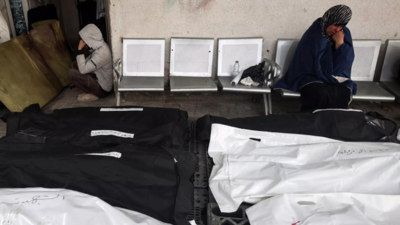
Israeli officials announced the latest evacuation orders, citing the need to protect civilians from the ongoing military campaign targeting Hamas militants. The evacuation order is part of Israel’s broader strategy to minimize civilian casualties as its forces intensify operations against Hamas, who remain entrenched in densely populated urban areas. The latest directive marks an escalation in Israel's military approach, signaling a determination to push forward with operations despite ongoing negotiations.
The talks in Doha, which concluded without a definitive agreement, involved key players from various regional powers. Qatari diplomats, along with representatives from Egypt and the United Nations, engaged in discussions aimed at finding a pathway to a ceasefire. However, significant differences between the parties have so far prevented a breakthrough. The talks are set to continue next week in Cairo, where negotiators hope to build on the progress made in Qatar.
Mediation efforts have faced considerable challenges, with both Israel and Hamas presenting firm demands. Israel insists on the complete disarmament of Hamas and the return of hostages held by the group as preconditions for any ceasefire. On the other hand, Hamas demands an end to the Israeli blockade of Gaza and assurances regarding the rebuilding of the territory, which has suffered extensive damage due to the conflict.
The situation in Gaza remains dire, with humanitarian agencies warning of an escalating crisis as the conflict drags on. The United Nations has repeatedly called for a halt to the violence to allow for the delivery of aid to the millions of civilians affected by the conflict. However, with the latest evacuation orders, the humanitarian situation is expected to worsen as more civilians are displaced from their homes.
Israel’s military operations have continued unabated, with airstrikes targeting what the Israeli Defense Forces (IDF) describe as Hamas' military infrastructure. These operations have drawn widespread international concern, with many countries urging both sides to de-escalate the situation and return to the negotiating table. However, the IDF maintains that its actions are necessary to neutralize the threat posed by Hamas and to ensure the security of Israeli citizens.
As the conflict enters a critical phase, the international community is closely watching the developments. The European Union, the United States, and other major powers have expressed support for the ongoing mediation efforts while urging both Israel and Hamas to make concessions to achieve peace. However, the lack of tangible progress in the negotiations so far has left many concerned about the potential for further escalation.
Next week’s talks in Cairo are being viewed as a crucial opportunity for diplomacy to prevail. Egyptian officials have been actively involved in mediating previous conflicts between Israel and Hamas, and there is hope that their efforts will yield results this time as well. However, with the situation on the ground continuing to deteriorate, the window for achieving a ceasefire may be narrowing.
Israel's latest evacuation orders and the continuation of its military campaign highlight the complexities of the ongoing conflict. As diplomatic efforts persist, the region remains on edge, with the prospect of peace hanging in the balance. The coming days are expected to be decisive in determining whether the negotiations can succeed in bringing an end to the violence, or if the conflict will continue to escalate further.
Topics
World
